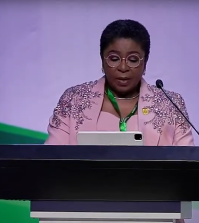COP27: how finance ministries are working to net zero – but ‘missed a trick’ on COVID-19 response

Much talk at the COP27 has already touched on the centrality of finance to helping the world reach net zero and tackle the effects of climate change, with many developing countries calling on rich nations to pay for the ‘loss and damage’ they’ve suffered as a result of climate impacts, for example. This would build upon the US$100bn climate finance goal set at last year’s COP26 in Glasgow, which aimed to provide support to countries by 2023 to help them make the switch to cleaner energy and infrastructure.
Ahead of COP27 in Egypt, Global Government Forum brought together a panel of experts to discuss how adequate and predictable climate finance is key to climate action, and the need for clear funding to help developing countries decarbonise at the pace needed.
This webinar looked at the work governments are doing to provide the required funding, and at what further detail is needed to make progress on existing commitments and to build more trust between developing and developed countries.
Here, we set out the key points discussed during the webinar, with clips from relevant sections.
Sara Tolonen, financial specialist at The Coalition of Finance Ministers for Climate Action within Finland’s Ministry of Finance, discussed the country’s pledge to provide €900m (US$899m) in funding between 2020 to 2025 for climate action in developing countries. The funding is made up of grant-based, investment-based, and loan-based assistance, with grant-based climate finance flows equally split between funding for adaptation and mitigation to “bridge the gap” for adaptation financing that currently exists.
Tolonen also spoke about how finance ministries have an interest in climate finance, in part to ensure that financial markets function properly and that the use of public finances is effective in addressing climate concerns, from both mitigation and adaptation angles. “There’s an urgent need to enhance know-how capacities and involvement of the finance ministries,” she said.
She explained that The Coalition of Finance Ministers for Climate Action, which has 78 member countries and 25 institutional partners, is working to find ways to better mobilise finance in order to meet the goal to provide $100bn of climate finance a year.
“The US$100bn annual goal must be reached, and the access to financing needs to be enhanced,” she said. “In the Coalition, we work together, we learn to understand the policy challenges and we help each other.”
It also works to identify and manage risks in recipient countries, and to promote the use of better financial instruments such as blended finance tools and green bonds, as well as mainstreaming climate into economic and financial policies.
“Finance ministries are ready to be more involved, but we need to cooperate more efficiently together, both at national and international levels to ensure that we maximise the climate impacts of our financial inputs,” Tolonen said.
Christoph Baumann, the envoy for sustainable finance at the State Secretariat for International Finance (SIF) in Switzerland, spoke about the work of the G20 in this area, including the creation of a roadmap for future G20 presidencies to work on the development of climate finance.
The G20 sustainable finance working group has developed a framework for transition finance setting out how to incentivise economies to transition to net zero by mid-century or whatever net zero goal countries set for themselves.
Baumann also highlighted the importance of the financial guidelines for net zero, established around COP26 last year, and which brings together all major net zero alliances in the finance sector – banking, asset owners, insurance and asset manager initiatives.
The G20 has also worked on scaling sustainable finance instruments with a focus on improving accessibility and affordability, and Baumann said he would expect future G20 presidencies of India and Brazil “to really have a focus on how we can mobilise private sector capital for de-risking facilities where the government or the finance ministries play a role”.
Mattias Frumerie, the head of the delegation to United Nations Framework Convention on Climate Change at the Ministry of Environment in Sweden, discussed how the country integrates its work on climate action into both budgeting and legislation.
“There is a sort of a step guide, basically, for all government employees on how to integrate climate action into those processes. And it actually entails not only climate and environment, but also gender and how specific actions contribute to jobs and growth. So any budget proposal which would be put forward also needs to include that analysis on the impact on climate and environment.”
Frumerie also highlighted the important role of government in setting the regulatory environment more generally, with 2045 set as the date for Sweden to be climate neutral.
“That provides a platform for the transformation of the economy as a whole towards that goal, which then gives the clarity needed for various actors in society in terms of the transition that we’re doing,” he said.
A climate policy council has also been formed to provide independent oversight of this aim and provide annual updates on what has been achieved towards the 2045 goal.
Frumerie also touched on the development finance Sweden provides as a donor country, which is based on the needs and priorities set forward by developing countries.
“As a result of that, almost 50% of our bilateral climate finance is geared towards climate adaptation, which we see as a result of developing countries prioritising finance for climate adaptation in their dialogue with us as donors. We’re also integrating climate action throughout our development corporation,” he explained.
Export finance provided to Swedish companies when doing business in other countries is also very much geared towards supporting the transition to net zero. But Frumerie said that ultimately public funds “will only go so far” when it comes to supporting the transition to net zero, so work is needed to create regulatory environments that incentivise the deployment of finance to support the implementation of the Paris Agreement.
“Our approach would be to highlight the urgency of climate action given what the IPCC tells us, that we need to cut emissions in half by 2030. But also to highlight the opportunities that we see in terms of what climate action brings winters, new jobs and economic growth, and the opportunities that we see now for countries to be working together to accelerate the transition in order to make sure that we limit temperature rise to 1.5 [degrees Celsius] and at the same time, create more resilient societies.
“Finance ministers really have a key role both to put the internal procedures in place to deliver on climate action and then of course, working together with partners globally, to share best practices and make sure that we can deliver on our Paris targets,” he said.
In questions from the webinar’s audience, the panel discussed:
How governments ‘missed a trick’ on using spending to recover from the coronavirus pandemic to boost green industries:
Whether silos in the civil service are a barrier to finance ministries playing a greater role in climate action:
The “positive pressure” The Coalition of Finance Ministers for Climate Action puts on members to take action:
And whether there is a risk that finance becomes the primary factor limiting climate action, as opposed to political will:
To learn all this and more, you can watch the full Money for net zero: how finance ministries can help support global climate action webinar on our dedicated event page. The webinar was held on 18 October 2022.





















